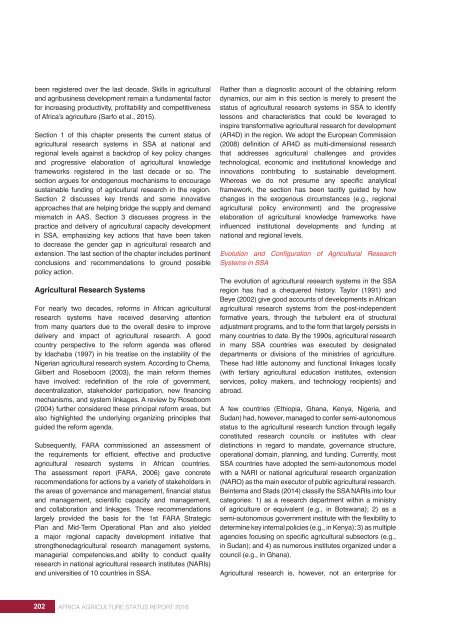AFRICA AGRICULTURE STATUS REPORT 2016
AASR-report_2016-1
AASR-report_2016-1
You also want an ePaper? Increase the reach of your titles
YUMPU automatically turns print PDFs into web optimized ePapers that Google loves.
een registered over the last decade. Skills in agricultural<br />
and agribusiness development remain a fundamental factor<br />
for increasing productivity, profitability and competitiveness<br />
of Africa’s agriculture (Sarfo et al., 2015).<br />
Section 1 of this chapter presents the current status of<br />
agricultural research systems in SSA at national and<br />
regional levels against a backdrop of key policy changes<br />
and progressive elaboration of agricultural knowledge<br />
frameworks registered in the last decade or so. The<br />
section argues for endogenous mechanisms to encourage<br />
sustainable funding of agricultural research in the region.<br />
Section 2 discusses key trends and some innovative<br />
approaches that are helping bridge the supply and demand<br />
mismatch in AAS. Section 3 discusses progress in the<br />
practice and delivery of agricultural capacity development<br />
in SSA, emphasizing key actions that have been taken<br />
to decrease the gender gap in agricultural research and<br />
extension. The last section of the chapter includes pertinent<br />
conclusions and recommendations to ground possible<br />
policy action.<br />
Agricultural Research Systems<br />
For nearly two decades, reforms in African agricultural<br />
research systems have received deserving attention<br />
from many quarters due to the overall desire to improve<br />
delivery and impact of agricultural research. A good<br />
country perspective to the reform agenda was offered<br />
by Idachaba (1997) in his treatise on the instability of the<br />
Nigerian agricultural research system. According to Chema,<br />
Gilbert and Roseboom (2003), the main reform themes<br />
have involved: redefinition of the role of government,<br />
decentralization, stakeholder participation, new financing<br />
mechanisms, and system linkages. A review by Roseboom<br />
(2004) further considered these principal reform areas, but<br />
also highlighted the underlying organizing principles that<br />
guided the reform agenda.<br />
Subsequently, FARA commissioned an assessment of<br />
the requirements for efficient, effective and productive<br />
agricultural research systems in African countries.<br />
The assessment report (FARA, 2006) gave concrete<br />
recommendations for actions by a variety of stakeholders in<br />
the areas of governance and management, financial status<br />
and management, scientific capacity and management,<br />
and collaboration and linkages. These recommendations<br />
largely provided the basis for the 1st FARA Strategic<br />
Plan and Mid-Term Operational Plan and also yielded<br />
a major regional capacity development initiative that<br />
strengthenedagricultural research management systems,<br />
managerial competencies,and ability to conduct quality<br />
research in national agricultural research institutes (NARIs)<br />
and universities of 10 countries in SSA.<br />
Rather than a diagnostic account of the obtaining reform<br />
dynamics, our aim in this section is merely to present the<br />
status of agricultural research systems in SSA to identify<br />
lessons and characteristics that could be leveraged to<br />
inspire transformative agricultural research for development<br />
(AR4D) in the region. We adopt the European Commission<br />
(2008) definition of AR4D as multi-dimensional research<br />
that addresses agricultural challenges and provides<br />
technological, economic and institutional knowledge and<br />
innovations contributing to sustainable development.<br />
Whereas we do not presume any specific analytical<br />
framework, the section has been tacitly guided by how<br />
changes in the exogenous circumstances (e.g., regional<br />
agricultural policy environment) and the progressive<br />
elaboration of agricultural knowledge frameworks have<br />
influenced institutional developments and funding at<br />
national and regional levels.<br />
Evolution and Configuration of Agricultural Research<br />
Systems in SSA<br />
The evolution of agricultural research systems in the SSA<br />
region has had a chequered history. Taylor (1991) and<br />
Beye (2002) give good accounts of developments in African<br />
agricultural research systems from the post-independent<br />
formative years, through the turbulent era of structural<br />
adjustment programs, and to the form that largely persists in<br />
many countries to date. By the 1990s, agricultural research<br />
in many SSA countries was executed by designated<br />
departments or divisions of the ministries of agriculture.<br />
These had little autonomy and functional linkages locally<br />
(with tertiary agricultural education institutes, extension<br />
services, policy makers, and technology recipients) and<br />
abroad.<br />
A few countries (Ethiopia, Ghana, Kenya, Nigeria, and<br />
Sudan) had, however, managed to confer semi-autonomous<br />
status to the agricultural research function through legally<br />
constituted research councils or institutes with clear<br />
distinctions in regard to mandate, governance structure,<br />
operational domain, planning, and funding. Currently, most<br />
SSA countries have adopted the semi-autonomous model<br />
with a NARI or national agricultural research organization<br />
(NARO) as the main executor of public agricultural research.<br />
Beintema and Stads (2014) classify the SSA NARIs into four<br />
categories: 1) as a research department within a ministry<br />
of agriculture or equivalent (e.g., in Botswana); 2) as a<br />
semi-autonomous government institute with the flexibility to<br />
determine key internal policies (e.g., in Kenya); 3) as multiple<br />
agencies focusing on specific agricultural subsectors (e.g.,<br />
in Sudan); and 4) as numerous institutes organized under a<br />
council (e.g., in Ghana).<br />
Agricultural research is, however, not an enterprise for<br />
202 <strong>AFRICA</strong> <strong>AGRICULTURE</strong> <strong>STATUS</strong> <strong>REPORT</strong> <strong>2016</strong>


